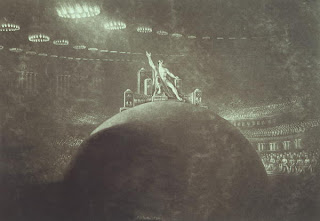Chances are, you've heard we've yet another end of the world on our hands. Just in case something does happen later, let's talk about writers' fixation on the apocalypse - now!
It's fairly common for sci-fi writers to mention the end of the world; either as a setting for the tale or a potential stake if the hero loses. The apocalypse offers a great deal of freedom for an author to craft (or un-craft) his world. It also goes along way towards sparking public interest in how our little blue marble may one day meet its maker. In recent year it's been all about the zombies; zombies with guns, zombie plagues, fat zombies, short zombies, zombies that climb on rocks, the list goes on. No one is sure how the cultural movement began (though the word has roots in voodoo and Night of the Living Dead seems to be their first successful mainstream outing), but the walkers are now inundating mass media, from Call of Duty games to The Walking Dead comics to The View.
Going further back we see definitive streaks of alien invasions/annihilations. Meteor strikes and other natural phenomena are safe bets too in the right setting (Roland Emerich's made a career of it, with Independence Day and Day After Tomorrow, among others).
The 2012 Mayan Apocalypse has sparked its own number of responses, from the big budget (2012) to Walmart bin Schlock I can't even remember. This past weekend I saw 4 different trailers for end-of-the-world movies, including the deftly titled After Earth (by the incomparable M. Knight Shaymalan), a romantic comedy with - you guessed it- zombies, and the requisite "Giant Robots fight Giant Monsters" flick.
The point is, even when we aren't supposed to die later in the week, pop culture has a fascination with the End. Have we exhausted all possible scenarios? Will we ever have a new fate to fear? WE may never know.
5
Now that that's out of the way...
If you are reading this, it means the world may not have ended yet, which means it's time for the Super Secret Holiday Message! In every blog post I've made thus far (starting with #2) I have left a fragment to a coded message of the utmost yuletide importance. Can you decode it? Here's a hint:
9=I
20=T
Good Luck, Happy Holidays, and listen to the Little Orphan Annie radio show!





